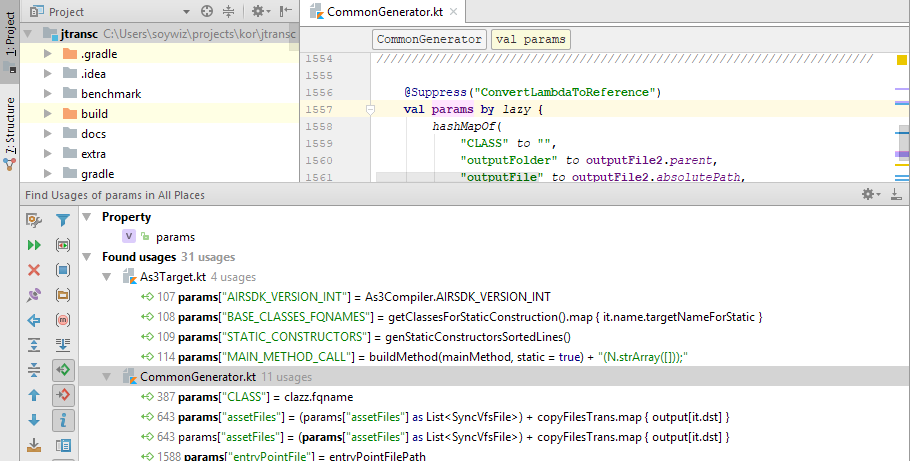Minitemplates
JTransc uses Minitemplates in several places.
Minitemplates is an embedded simple template engine created for JTransc based on twig, my project atpl.js, liquid among others.
Use cases:
- When embedding external code in anotations
- When including target language files
- When specifying a custom command line for building
- When defining a target custom bootstrap main
- When generating project files requiring for build tools
What can I do with Minitemplates?
Inside Minitemplates you have access to parameters/configuration variables for that build.
Also you can get actual target generated names for: classes, methods and fields.
Generated names could not match ones from the original source in some targets. Also minimizing/obfuscating names could lead to totally different names.
Syntax
Minitemplates allow you to use tags and expressions.
Basic syntax:
{% tag ... %} - A self-closed tag
{% tag ... %}...{% end %} - A tag that opens and then ends (and can contain other meaningful tags inside)
{{ expression }} - A expression that evaluatesExpressions:
Expressions are like other’s language expressions. In there you can use normal unary and binary operators, access fields/elements with . or [] just like in ecmascript based languages.
And there is an addition called filters. Filters are in postfix positions and are similar to extension methods, and are denoted with pipe | symbol. So for example the upper filter could be used like this mystring.
You can have literals: strings, numbers and arrays.
Also you can reference variables available in its current context. Inside the for tag you can access the iteration variable.
Available Standard Tags:
{% if expression %}...{% end %} - Just evaluates fragment inside tag in the case expression evaluates as truthful
{% if expression %}...{% else %}...{% end %} - Evaluates if or else blocks depending on the expression result
{% for var in expression %}...{% end %} - Loops over an iterable expression and holds each value in the specified var
{% assign var = expression %} - Assigns the result of an expression to a variable
{% debug expression %} - Outputs debug information
Tags to statically reference classes, fields and methods
{% SINIT fqname.to.Class %} - Replaces with a complete statement with a static initializer for a class. You must call this before calling or accessing static methods and fields.
{% CONSTRUCTOR fqname.to.Class:descriptor %} - Replaces with a class instantiation code for a specific constructor, requires appending brackets later.
{% CLASS fqname.to.Class %} - Replaces with the fully qualified name of the class.
{% METHOD fqname.to.Class:name:descriptor %} - Replaces with the method name.
{% FIELD fqname.to.Class:name:descriptor %} - Replaces with the field name.
{% IMETHOD fqname.to.Class:name:descriptor %} - Replaces with '.' plus the method name (in the case of javascript can be replaced with 'name' too).
{% IFIELD fqname.to.Class:name:descriptor %} - Replaces with '.' plus the field name (in the case of javascript can be replaced with 'name' too).
{% SMETHOD fqname.to.Class:name:descriptor %} - It is a shortcut for CLASS + METHOD tags for calling static methods.
{% SFIELD fqname.to.Class:name:descriptor %} - It is a shortcut for CLASS + FIELD tags for accessing static fields.
Note: On METHOD and SMETHOD descriptor is optional when there is just one single method overloading. Otherwise a method descriptor looks like: (II)Ljava/lang/String; and you can find more about Method Descriptors in the java specification.
An example using this for Haxe generated code could be:
static public function init() {
{% SINIT com.jtransc.media.JTranscInput %}
}
private function mouseInfo() return {% SFIELD com.jtransc.media.JTranscInput:mouseInfo %};
override public function onMouseUp(window:Window, x:Float, y:Float, button:Int):Void {
mouseInfo(){% IMETHOD com.jtransc.media.JTranscInput$MouseInfo:setScreenXY %}(Std.int(x), Std.int(y));
mouseInfo(){% IFIELD com.jtransc.media.JTranscInput$MouseInfo:buttons %} &= ~(1 << button);
inputImpl(){% IMETHOD com.jtransc.media.JTranscInput$Handler:onMouseUp %}(mouseInfo());
}
Available filters
|length - Evaluates to the length of a list or string
|upper - Uppercases the whole string
|lower - Lowercases the whole string
|capitalize - Uppercases the first character of the string and lowercases the rest
|trim - Strips starting and ending whitespace characters
|join('separator') - Joins something iterable with the specified separator
|file_exists('file') - Evaluates to true in the case the specified file exists
|quote - Quotes a string "like \"this\""
|escape - Escapes a string (like quotes but without wrapping within "") like \"this\"
Available identifiers in templates
srcFolder- Operating system full path where target sources (haxe for example) are generated. Example:target/jtransc-haxe/srcbuildFolder- Operating system full path with the jtransc target folder. Example:target/jtransc-haxehaxeExtraFlags- A List<Pair<String, String» with flags FLAG=VALUE. Example:listOf("-lib" to "haxe-ws:0.0.6")haxeExtraDefines- A Listwith additional defines. Example: `listOf("analyzer=1")` actualSubtarget- An object representing the actual subtarget (that object contains name, alias)outputFile- Absolute Path to the expected output file Example:target/program.jsrelease- Boolean indicating wether this is a release build or not. Example:truedebug- Boolean indicating wether this is a debug build or not. Example:falsereleasetype- String indicating kind of release. Possible values: “release” or “debug”. Example:debugsettings- A AstBuildSettings object with the whole settingstitle- Specified title in maven configurationname- Specified name in maven configurationpackage- Specified package in maven configurationversion- Specified version in maven configurationcompany- Specified company in maven configurationinitialWidth- Specified initialWidth in maven configurationinitialHeight- Specified initialHeightin maven configurationorientation- Specified orientation maven configuration. Possible values: (auto, portrait, landscape)tempAssetsDir- (Deprecated use mergedAssetsdir)mergedAssetsDir- Path to the temporal directory that contains all the assets merged togetherembedResources- Boolean indicating wether to embed resources or notassets- Folder containing assetshasIcon- Boolean indicating if there was specified an icon or noticon- Path to icon filelibraries- List of target libraries to includeextra- Map<String, String> containing all the extra defined configurationsJTRANSC_VERSION- Version of JTransc eg. 0.6.0
After building sources, inside for example HaxeCustomMain:
entryPointFile- File that holds the entrypointentryPointClass- Fully qualified name for the entry point class
Specific targets can define custom template variables. To prevent them being outdated, please locate CommonGenerator.params field and find references:
